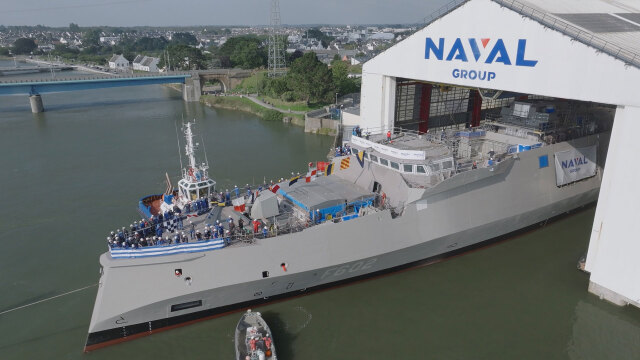The Greek summer kicks off with the launch of the “Formion”, the third FDI frigate, which will be inaugurated on June 4 in France. This event comes amid intense discussions regarding the modernization of the Greek fleet.
The launch marks a significant step in the Navy’s evolution, as substantial strike units are becoming more prominent. Concurrently, the Greek defense industry is gearing up, extending its reach to shipyards.
Prime Minister Kyriakos Mitsotakis has strongly emphasized the importance of developing a self-sufficient Greek defense industry. During a recent visit to the Supreme Military Command of the Interior and Islands (ASDEN), he highlighted the integration ceremony of two upgraded V-Bat unmanned systems, donated by Mr. Athanasios Laskaridis.
“It is unimaginable for a country that spends billions on armaments not to possess its own domestic defense industry,” Mitsotakis reiterated, pointing to ELKAK as a hub of emerging start-up companies in the defense sector that will keep pace with technological advancements.
Reports indicate that the new defense doctrine emphasizes “dual-use” systems, in response to the rapidly evolving nature of warfare, where drones and anti-drone technologies have transformed the battlefield.
Unified Model
In this context, there is active consideration for developing a “Greek ship”, aiming for a cohesive model. This vessel could feature a modular design, approximately 80 meters in length, allowing for adaptable equipment and weapon systems based on its mission. This approach aims to reduce costs while revitalizing the “construction memory” of Greek shipyards that have seen diminished activity in recent years.
Countries like The Netherlands, Spain, and Germany already utilize similar naval platforms. A critical factor in transitioning the Greek naval fleet towards autonomy lies in accumulating experience and attracting personnel who have either moved to the private sector or left the field due to disinterest.
Furthermore, rejuvenating the potential for constructing Greek “flexible ships” may ultimately meet the needs of other Greek security forces, fostering a new shipbuilding culture aimed at producing large strike units.
The “dual-use” philosophy is integral to the new vision for the Armed Forces, as the timeline for developing new infrastructure, alongside rapid advancements in defense technology, necessitates “smart solutions” aligned with the country’s fiscal capabilities.
Ask me anything
Explore related questions

















